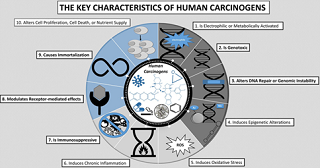Science Leadership
Superfund Research Program (SRP) staff and grant recipients are committed to advancing research by presenting innovative findings, tools, and technologies to stakeholders in academia, government, and communities.
SRP Director Bill Suk, Ph.D., and Health Scientist Administrator Michelle Heacock, Ph.D., joined other experts in environmental health and toxicology at the International Convention of Environmental Health and Children's Health in Montevideo, Uruguay. This virtual conference was held November 18 - 20, 2020, and addressed the effects exposures to environmental chemicals have on the health and well-being of children in South America. Suk discussed multi-disciplinary research to reduce children's global burden of disease, and Heacock provided an overview of the benefits of SRP research for children's environmental health.
Suk co-chaired the first session of the Collegium Ramazzini's annual meeting , which was held virtually in October. The Collegium Ramazzini is an independent, international academy with the mission to advance knowledge of occupational and environmental health, prevent disease, and save lives. Suk also served on the scientific agenda committee that helped to shape the seminar's agenda.
SRP staff is pleased to welcome Sara Amolegbe, M.S.P.H., as their newest Health Specialist. Amolegbe comes to NIEHS with 8 years of experience in environmental health communication as well as training and experience in environmental health research and project management. She has a Bachelor of Science in environmental health and received her Master of Science in Public Health in environmental sciences and engineering from the University of North Carolina at Chapel Hill.
SRP Health Scientist Administrator Heather Henry, Ph.D., served on the planning committee for the December 2, 2020, Triangle Global Health Consortium virtual annual meeting with a focus on "Global Health in the COVID-19 Era: Leadership in Action." In addition to presenting the work SRP is doing in COVID-19 research, she also participated in a panel discussion on "Using Disaster Research Response to Empower Data Collection for the COVID-19 Research Response."
Henry is on the Scientific Planning Committee for the NIEHS-hosted Xenobiotics and Microbiome workshop being held virtually on February 24 - 25, 2021. The meeting will showcase NIEHS-funded grant recipients working on the intersection between microbiome and environmental health.
SRP Health Scientist Administrator Danielle Carlin, Ph.D., participated in the North Carolina Chapter of the Society of Toxicology (NCSOT) meeting , which was held virtually in September. She served as a judge for the President Award for Research Competition (PARC) Award, a platform competition for postdoctoral scholars. The winner moves on to give a 20-minute presentation at the regional chapter meeting. Carlin is a Past-President for NCSOT, serving as an officer from 2014-2017.

University of California, Berkeley Superfund Research Program Center (UC Berkeley SRP Center) researchers and collaborators developed a new approach to help risk assessors predict the toxicity of chemicals based on shared characteristics. Called the key characteristics approach, the latest SRP Public Health Impacts story explains how this method helps risk assessors more easily identify, organize, and summarize the potential health risks of many different chemicals.
A new NIEHS Superfund Research Program (SRP)-funded study demonstrated a strategy to characterize how exposure to polychlorinated biphenyls (PCBs) may harm human health, particularly the cardiovascular system. Researchers at the Texas A&M University SRP Center and the University of Iowa SRP Center identified certain biological and chemical characteristics (i.e., chlorination pattern, metabolite status) that could be used to predict how PCBs affect cells and how their data analysis strategy could be used to fill data gaps.
to Top



